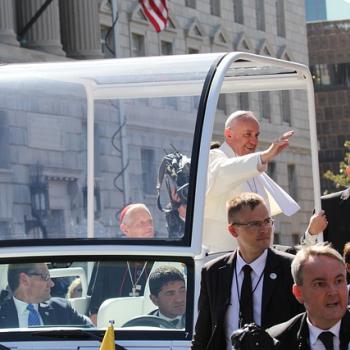
I want to remind my readers that our souls will be judged on how we treat immigrants.
And that’s not the only reason why you should be against the things that are being done to immigrants right now.
The Bible isn’t clear about as many things as people claim. In general, if you say “the Bible is clear,” you’re probably being naive. But the Bible actually IS very clear, that you are not to abuse immigrants living among you. “I was a stranger and you did not welcome me” is one of the sins that separates the sheep from the goats in Matthew 25.
Just as individuals and families are supposed to have rules and boundaries to keep themselves safe, countries are allowed to have rules and boundaries too. Just as you ought to mind your manners if you’re a guest in somebody’s house, immigrants should obey the law when they come to a new country. There’s nothing wrong with having a certain amount of control over our borders, or with vetting people who want to live and work here to make reasonably sure they’re not likely to be violent. But we have to treat immigrants humanely. And we absolutely must err on the side of kindness whenever we possibly can. They are guests, not vermin.
If a visitor from another country absolutely won’t act lawfully to keep others safe, that person should be put in jail or perhaps send back to their home country. That’s reasonable. But the Catholic Church warns us that deportation and arbitrary imprisonment are gravely wrong.
Putting anyone, citizen or not, in prison ought to be a last resort to protect the public from a person who is truly dangerous, and even while they’re in prison, they have to be kept in humane conditions.
Deportation is an equally drastic step.
As Americans, if we have probable cause to believe that a human being committed a crime, law enforcement is supposed to take the evidence to a judge and get a warrant. Then the person is entitled to a fair trial before they’re punished. And they’re not supposed to be punished if they haven’t even committed a crime. Ours is far from a perfect system. It’s failed plenty of times, and a huge number of reforms are necessary. But it’s something. It’s a set of rules that are supposed to protect the rights of the innocent instead of pure chaos. And everyone who is in the United States, whether citizens or not, needs to be governed by the same rules or nobody is safe.
It is immoral to round up immigrants who were here legally and imprison or deport them for exercising their right to free speech– even if it’s technically legal to revoke a green card for any reason. And furthermore, it leaves all of us unsafe. I promise you, if they can revoke someone’s green card for speaking their mind, they will eventually start punishing citizens for the same offense.
It is grossly immoral to take human beings who came to us for help, label them as dangerous for an arbitrary reason such as a tattoo, and then ship them away to a horrendous prison in another country they didn’t come from in the first place. If they were really gangsters, they ought to have been put on trial to prove that charge. The fact that we didn’t is itself a crime. And it leaves all of us unsafe. If we decided to deny some people due process, I promise you, the number of people who are denied due process will just go further and further up. If we can ship immigrant prisoners to a gulag overseas, we can ship anybody there.
Every one of us should be speaking out against these things, because they’re wrong. The injustice ought to turn your stomach. But if you need another reason, we should be speaking out because these actions put every single human being in the United States in danger.
The Gospel says, “whatsoever you did to the least of my brethren, you did to me.” That’s our moral responsibility.
Either the same rules apply to everyone, or no one is safe. That’s our responsibility as citizens.
Your immortal soul is in danger right now. So is the rest of you. Speak out while you still can.
Mary Pezzulo is the author of Meditations on the Way of the Cross, The Sorrows and Joys of Mary, and Stumbling into Grace: How We Meet God in Tiny Works of Mercy.












